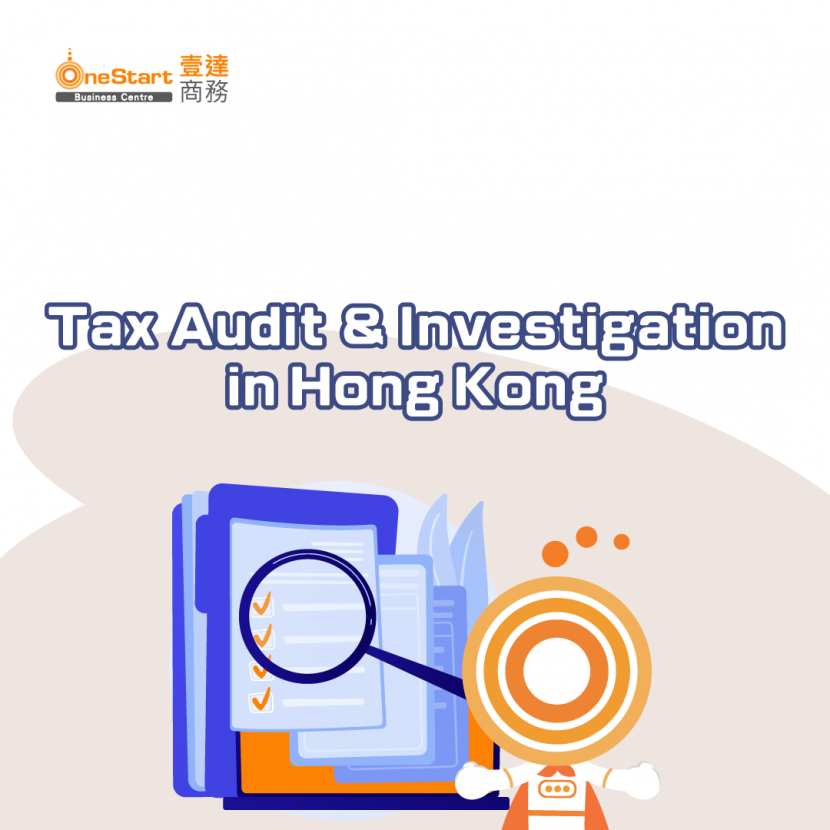Related Article:
【Entrepreneurs Must-Read】Hong Kong Profits Tax Guide 2024
How to Calculate Property Tax? Tips to Save on Property Tax
Table of contents |
In recent years, the Hong Kong Inland Revenue Department (IRD) has been actively cracking down on tax evasion and avoidance issues, and some businesses may receive tax audit notifications from the tax bureau. Most companies feel anxious when receiving such notifications, but as long as they always comply with accounting and tax standards and maintain good record-keeping, there is no need to worry too much. This article will introduce the common reasons, procedures, and related penalties for tax field audits / investigations, so that you can better deal with tax inspections.

Reasons for Tax Field Audits / Investigations
- The auditor's report contains heavily qualified opinions.
- The company is continuous operation and its profitability are unreasonably low compared to others in the same industry.
- Failure to submit tax returns on time / No tax returns filed for many years.
- Inability to adequately keep business or accounting records.
- Failure to provide the Assessor with required key information.
- Receiving information from other sources (e.g. other government departments) or whistle-blowers that is inconsistent with the reported information.
- The company's expenses involve funds from unknown sources or personal expenses.
- The company conducts a large number of suspicious transactions with overseas parties.
- Random sampling by the tax bureau.
The Inland Revenue Department has many reasons to conduct tax audits or investigations on taxpayers. When receiving a tax audit notice, it is recommended that taxpayers can identify the reasons for the audit through tax representatives or professional accountants, which can more effectively find relevant solutions.
3-Step Tax Audit Process
The tax field audits and investigations of the Inland Revenue Department are usually divided into the following 3 steps:
Desk Audit
For cases with automatic assessment, the assessors will review the selected risk areas and conduct a comprehensive examination of the cases. When clarification from the taxpayer is needed, the assessors will issue a written enquiry, and the taxpayer must follow the instructions in the assessment notice issued.
Field Audit
When signs of non-compliance are found, the tax bureau will send staff to examine the taxpayer's accounts and business situation on-site to verify the accuracy and completeness of the tax return. The audit will start from the most recent tax year and based on the results, determine the potential understatement of profits in the past years.
Tax Investigation
When there are suspicions of tax evasion or more serious problems, the Inland Revenue Department will conduct a more in-depth review. Investigations usually cover the tax years starting from 6 years before the investigation is initiated. If the case involves fraud or intentional tax evasion, the investigation scope may be extended to 10 tax years prior.
When receiving a tax audit notice from the Inland Revenue Department, you can check the file number in the upper left corner of the letter to understand the nature and severity of the case. For example, "4B4-A123456-ABC(16)":
- The first segment 4A/4B/4C represents the taxpayer case group.
- The second segment A123456, where A represents an anti-tax avoidance, B represents a tax investigation, C represents a field audit, and D represents a review case.
- The last (16/17) represents the 16th or 17th floor of the tax office.
Tax Investigation Process
- Collect and investigate the taxpayer's background information, including accounting records, bank records, etc.
- Initial meeting with the Assessor.
- The Assessor visits the relevant premises to understand the company's operating conditions.
- The Assessor further collects and investigates the taxpayer's information.
- The Assessor negotiates solutions with the taxpayer on tax disputes and penalties to reach a consensus. If underreporting/tax evasion is discovered, penalties will be imposed or additional assessments will be issued.
Tax Investigation Penalties
All companies must strictly comply with the provisions of the Inland Revenue Ordinance. Taxpayers who seriously violate the relevant regulations may face heavy fines, up to HK$50,000 and possible imprisonment for 3 years, as well as an additional penalty of 3 times the amount of tax evaded.
Generally, unless it is a serious case of tax avoidance or evasion, and the tax investigation is properly handled, the Inland Revenue Department may not necessarily initiate criminal prosecution against the taxpayer. The professional accounting team of OneStart has rich experience in handling tax investigations and provides professional advice to solve tax problems.
How to Respond to Tax Investigations
- Comply with tax regulations
- Submit complete and accurate information on time
- Properly preserve all relevant information and accounting records
- Respond promptly to the Assessor's assessment proposals
- Understand the tax bureau's penalty policies and strive for leniency
Complying with regulations and being careful in tax reporting is the best way for companies to avoid investigations and penalties. At the same time, the Inland Revenue Department also regularly publishes prosecuted cases as a warning to other taxpayers to avoid similar mistakes, the details of which can be accessed through this link.

Conclusion
Tax investigations are a nightmare for many companies, but as long as you hire a professional accountant familiar with the tax investigation process to act as your tax representative, you can easily handle it. The professional accounting team of OneStart Business Centre has many years of experience and is trusted by customers. If you want to know more about corporate tax knowledge, please call 3575 6888 or WhatsApp OneStart business consultant to learn more.
Click to WhatsApp OneStart:
Know More About Our Services:
 |
 |
 |













